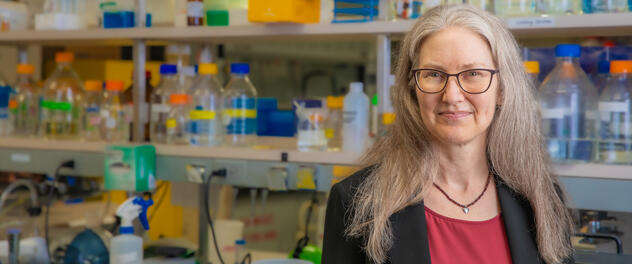 Blocking tumor invasion and metastasis
Blocking tumor invasion and metastasis
Dr. Radisky's research targets the natural interactions between enzymes and their endogenous inhibitors. These interactions can play a role in the development of cancer, including breast cancer, prostate cancer, pancreatic cancer, lung cancer and ovarian cancer.
Overview
The Proteases in Cancer Laboratory of Evette S. Radisky, Ph.D., at Mayo Clinic investigates proteases involved in several types of cancer. Our research focuses on the molecular interactions involved in inhibiting these proteases. We use techniques of structural biology, cell biology, enzymology, protein engineering and directed evolution to inhibit the proteases.
A crucial step in tumor development is invading surrounding tissues, a process that can cause distant metastases — the spread of cancer. Tumors accomplish this invasion through increased activity of enzymes that degrade the proteins connecting the cancer cells to each other and the structural elements of the extracellular matrix.
In the microenvironment of regular tissues, proteolytic activity is modulated by endogenous inhibitors that bind to and inactivate proteases. In malignant tumors, the delicate balance of production, activation and inhibition of proteases is often disturbed, leading to tumor cell invasion and dissemination.
Different forms of cancer show increased activity of specific proteases and decreased activity of the opposing endogenous inhibitors. Identification of these altered interactions provides a handle for therapeutic intervention.
By studying the natural interactions between these enzymes and their endogenous inhibitors, and by engineering new and more-selective inhibitors, our lab hopes to design better agents for blocking tumor invasion and metastasis. These agents could be used in a wide range of cancers, including breast cancer, ovarian cancer, pancreatic cancer, prostate cancer and lung cancer.
About Dr. Radisky
Dr. Radisky is a professor of cancer biology and a professor of pharmacology at Mayo Clinic College of Medicine and Science in Jacksonville, Florida. She has a research background in protein biochemistry and structural biology. Dr. Radisky's long-term focus is on the molecular recognition between proteases and protease inhibitors to engineer inhibitors with improved potency and specificity for use as cancer therapeutics.